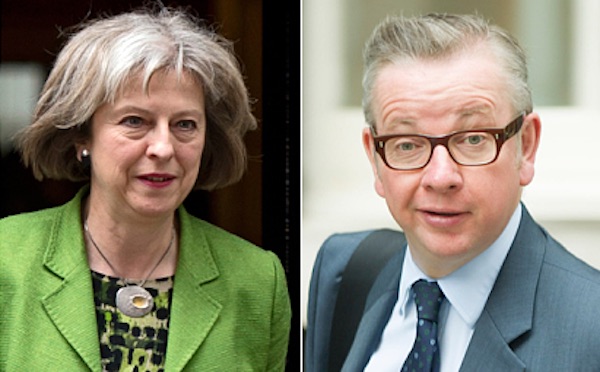
The battle to replace David Cameron as leader of the Conservative Party and British Prime Minister is set to be dominated by two contendors with extreme right-wing views.
Michael Gove (pictured, right) has strongly opposed the peace process and believes the SAS and other undercover killers should have been allowed to continue killing in Ireland and could have defeated the IRA.
Meanwhile, the other main contender, Home Secretary Theresa May is opposed to the human rights legislation which underpine the 1998 Good Friday Agreement. She has also said that border controls in Ireland are “inevitable” as result of the Brexit referendm to quit the European Union.
Gove, currently the Justice Minister, was a key figure behind the Brexit vote. He described the Good Friday Agreement as a “capitulation” by Tony Blair.
Gove wrote a long summary of his position on Ireland in 2000 in a pamphlet called “Northern Ireland the Price of Peace,” in which he stated the IRA was on the brink of defeat before the peace process took over.
Gove wrote: “...effective intelligence, counter-insurgency and containment (measures) could have progressively reduced the republican military threat. If such a policy had been matched by a political willingness to deny the IRA any purchase on the future constitutional position of Northern Ireland, then the resulting demoralization could have aided the work of the security forces. The prospect of an effective defeat of terror could have existed.
“But the British Government chose not to take that path. From 1989 onwards restrictions were placed on the operations of the most effective counter-terrorist measures.”
Gove argued that limiting the use of HMSU (Headquarter Mobile Support Unit) and SAS units who operated shoot-to-kill policies, was a disastrous mistake.
“After Loughgall and Drumnakilly, the government had become cautious, worried about shoot-to-kill accusations. But there were other, more expedient reasons for the changing political climate. The British government had started making behind-the-scenes moves in an effort to reach an accommodation with the Provisional IRA. In other words, the British State deliberately held its security forces back from inflicting military reverses on the IRA because it preferred to negotiate,” he wrote.
“To consider what might have happened if those restraints had not been placed is to engage in a counterfactual. We cannot know if the IRA could have been defeated. We only know that road was not taken for political reasons, and the decision not to take it came as Margaret Thatcher fell from power.”
Meanwhile, Theresa May has said Britain should withdraw from the European Convention on Human Rights.
“The ECHR can bind the hands of parliament, adds nothing to our prosperity, makes us less secure by preventing the deportation of dangerous foreign nationals - and does nothing to change the attitudes of governments like Russia’s when it comes to human rights,” she said in the lead up to the Brexit referndum.
“So regardless of the EU referendum, my view is this: if we want to reform human rights laws in this country, it isn’t the EU we should leave but the ECHR and the jurisdiction of its court.”
May was accused of “sacrificing Britain’s 68-year-old commitment to human rights for her own miserable Tory leadership ambitions”.
The comments were made by the then shadow Justice secretary, Charles Falconer, who said he was appalled by the home secretary’s attitude to human rights, which he described as “so ignorant, so illiberal, so misguided”.
May is also expected to take a hard line on border controls.
During the Brexit referendum campaign, during which she portrayed herself as reluctantly opposed, she warned that being in the EU made it harder to control the “volume of immigration”.
She said it was “inconceivable” that there will not be any changes on border arrangements in Ireland. “How could you have a situation where there was an open border with a country who is in the EU and has access to free movement?” she asked.
![[Irish Republican News]](https://republican-news.org/graphics/title_gifs/rn.gif)
![[Irish Republican News]](https://republican-news.org/graphics/title_gifs/harp.gif)

